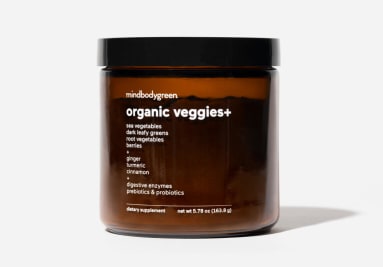10 Health Benefits Of Adding More Kale To Your Diet


Kale is frequently called “the queen of greens” and “a nutritional powerhouse.” It makes sense—one of the most popular leafy greens out there, kale is touted by many for its high nutrition content and beneficial vitamins. In case you needed more motivation to add more of this leafy green to your diet, read up on the top health benefits of kale.
Advertisement
1. Kale is great for digestion.
As a fibrous leafy green, kale is great for aiding in digestion and elimination. Don’t discard the stems, which are a rich source of prebiotics, which are food for your microbiome. While they're tough raw, sautéed in a bit of avocado or olive oil with some sea salt, they become a delicious, breadstick-like treat.
2. Kale is high in iron.
Iron is essential for good health, especially for women, as it helps with the formation of hemoglobin and enzymes, transports oxygen to various parts of the body, aids in cell growth, proper liver function1, and more. Want to up the iron quantity of your kale even more? Cook it in a cast-iron pan, and pair it with a food rich in vitamin C—this helps increase your body's ability to absorb plant-based iron.
Advertisement
3. Kale is high in Vitamin K.
"Vitamin K1 has always been known as the 'coagulation' vitamin because it helps keep the body’s blood-clotting mechanism functioning in a healthy manner. Vitamin K2, on the other hand, has been shown to activate 17 proteins. For example, vitamin K2 activates a protein called osteocalcin, which ensures that as much bone is built to replace the bone that is broken down. Vitamin K2 also encourages a protein called Matrix gla protein (MGP) to keep arteries healthy by discouraging calcium from sticking to the walls," explains cardiologist Joel Kahn, M.D. It's been shown to be protective against osteoporosis2, cancer3, and diabetes4.
4. Kale is filled with powerful antioxidants.
Antioxidants offer up one of their electrons to free radicals, thereby neutralizing “oxidant” radicals and keeping them from stealing an electron from our cells. At its best, this strong network of warriors can stop up to 99 percent of free radicals5 from damaging our cells. Antioxidants, such as carotenoids and flavonoids help protect against various cancers.
Kale contains high levels of6 antioxidants6—however, antioxidants are are heat-sensitive, so be sure to also incorporate the leaves in smoothies or salads to best preserve the antioxidant function.
Advertisement
5. Kale is a great anti-inflammatory food.
One cup of kale is filled with 10% of the RDA of omega-3 fatty acids, which play a vital role in fighting inflammation in the body. The sulfur-containing phytochemicals in kale (called glucosinolates) can also help maintain the body's normal inflammatory response.
6. Kale is great for cardiovascular support.
One study that featured male participants found that eating kale regularly significantly improved their coronary artery risk factors7 (likely in part due to it’s anti-inflammatory properties). The participants juiced the kale, although you can also lightly cook the kale before consuming to if you suffer from thyroid issues8.
Advertisement
7. Kale is high in Vitamin A.
Vitamin A is great for your vision9 and your skin.9 Just one cup of kale contains 206% of our daily vitamin A requirement!
8. Kale is high in Vitamin C.
"Vitamin C deficiency can cause rapidly increasing signs and conditions of aging," Taz Bhatia, M.D., has previously told mbg. "Plus, humans cannot manufacture large amounts of vitamin C on their own. Signs of deficiency include easy bruising, low iron levels, and bleeding gums."
This important nutrient exists in abundance in kale; although vitamin C is heat sensitive, so lightly sauté or blanch the leafy green to preserve it.
Advertisement
9. Kale is high in calcium.
Per calorie, kale has more calcium than milk. "Calcium is a mineral that’s important for building and maintaining strong bones and for carrying out a large number of body processes such as cell signaling involved in muscle and nerve function and helping blood vessels transport blood through the body," explains Jess Cording, R.D.
10. Kale promotes liver health.
Kale is filled with fiber and sulfur, both great for supporting your body's natural detoxification process and keeping your liver healthy. Kale is part of the cruciferous vegetable family, which may promote healthy digestion and can remove pollutants from the bloodstream.

Alison Lewis is a nationally known cookbook author; food, travel and health journalist; speaker; travel and food photographer; and owner of Ingredients, Inc., a media consulting company in Birmingham, Alabama.
9 Sources
- https://www.ncbi.nlm.nih.gov/pmc/articles/PMC3999603/
- https://www.ncbi.nlm.nih.gov/pubmed/25516361
- https://www.ncbi.nlm.nih.gov/pmc/articles/PMC5494092/
- https://www.ncbi.nlm.nih.gov/pubmed/21868771
- https://www.ncbi.nlm.nih.gov/pmc/articles/PMC3249911/
- https://www.ncbi.nlm.nih.gov/pubmed/22744944
- https://www.ncbi.nlm.nih.gov/pubmed/18548846
- https://www.ncbi.nlm.nih.gov/pmc/articles/PMC3153292/
- https://www.ncbi.nlm.nih.gov/pmc/articles/PMC3873196/

